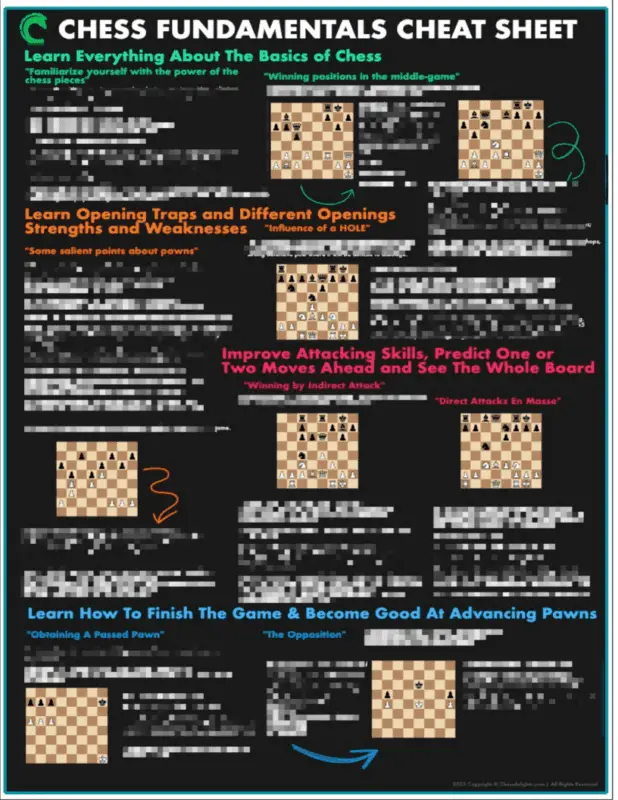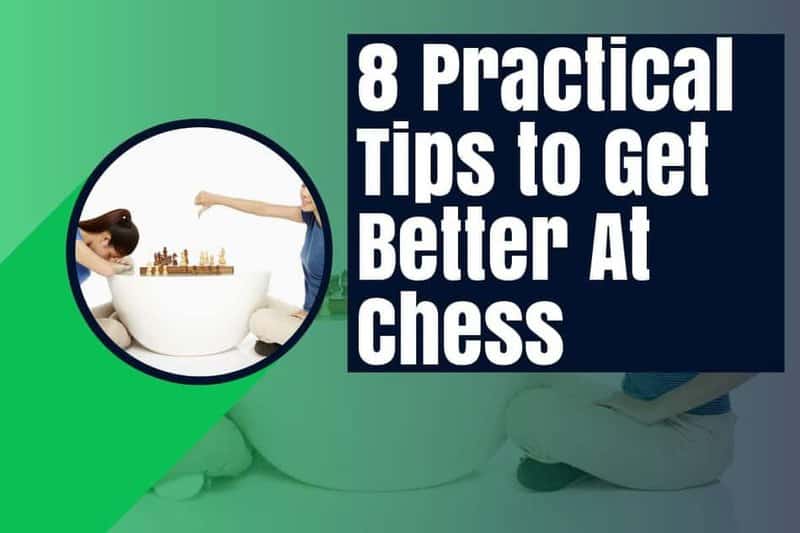A usual question arises when one wants to know the secret of being a master in chess (just like my daughter and me): how do I get better at chess fast?
However, the word “fast” is relative: in reality, you don’t get to advance your skill without months or even years of hard work, tons of practice, discipline, and sacrifice, and most importantly, constant reassessment of your losses and mistakes in your games.
Just like any other discipline, your skill in chess takes time to develop so you can master it in the long run.
- Practice, partnered with constant evaluation of your flaws in your games are two interconnected and inseparable skills that you need to hone so you can get better at chess.
- Playing every day and participating in tournaments are also both important in improving your skill in chess, but not wholly enough to get better at it.
- Playing every single day without studying your strategy and assessing your mistakes from the previous games would be like attacking your enemy blindly, making you counterproductive instead.
Table of Contents
8 Practical Tips to Get Better At Chess
1. Know and master the rules.
In chess, each piece has a special value. Understanding these values helps you win, especially as the game gets closer to a draw.
Here’s a simple guide:
- Pawns: 1 point
- Knights and Bishops: 3 points
- Rooks: 5 points
- Queen: 9 points
- King: priceless (you can't lose your king!)
Defending and Sacrificing
Sometimes, you need to give up a piece to protect your position or to set up a better move later. Think carefully before sacrificing a piece. It could change the game!
Using Bishops and Knights
Bishops and knights are very important. They can help you win or lose the game. Make sure to use them wisely!
Planning Pawn Attacks
Pawns are small but powerful. When you attack with pawns, do it carefully. If you rush in, you might be left unprotected in the endgame, where pawns become very important.
Learning Endgames
It’s good to know some basic endgames. Remember to keep your pawns alive! They can help you trade for a queen, which is very strong.
Maximizing Rooks and Bishops
As the game goes on, rooks and bishops become even more valuable. Use them to control the board and support your other pieces.
Teamwork in Chess
Think of your pieces like a team working together, like an orchestra or a battalion. Each piece has a role to play, and when they work together, you can win!
Tips for Success:
- Know the value of each piece.
- Be smart about defending and sacrificing.
- Use bishops and knights effectively.
- Plan your pawn attacks carefully.
- Learn basic endgame strategies.
- Maximize the power of your rooks and bishops.
- Always think of your pieces working together as a team.
By following these tips, you'll improve your chess skills and have more fun playing!
Recommended Reading: If you want to learn how to checkmate in 4 moves, read this article.
2. Keep practicing.
The Pareto optimum rule is 80% practice and 20% study.
Practice with chess puzzles such as Chesstempo, Chessity, or Puzzle Books.
Use chess apps as well. These serve as a small lens of looking at a chess game in different angles, which improve your vision of the chessboard.
This will help you to become more aware of both of your and your opponent’s mistakes and how it makes or breaks the whole gameplay either on your or his or her favor.
You can also improve your skill in chess better by downloading blindfold chess.
This will train you to master the attacking positions of your and your opponent’s pieces without actually looking at them.
3. Play a lot of games and tournaments.
The rule of thumb in any attempt to master a skill or discipline—in this case, chess—is to go out there to challenge your ability by participating in many games.
Get out there, apply what you’ve learned in your practice, and release the tension and participate in live games.
You can join chess clubs and tournaments.
The only way you can improve is not only when you win a game, but much more when you lose one or have been very much challenged by a strong opponent…
Because by then you will be able to be aware of your blind spots and learn from your mistakes so you can improve on them the next time you play…
Aim hard for the experience. You don’t aim to win every game or to raise your ranks at first. Study your games, then work your way up by building your style and improving your skill.
If you want to become a good chess player, you must be ready to swallow your pride and ego and challenge yourself by exposing yourself to stronger players even if it would mean that from time to time you will lose the game.
Losing a game does not and would not define your whole life. It would merely mean that you might not have done well at that particular tournament.
The best part of losing is learning from your mistakes and using them to improve your skill the next time you play.
Getting better at chess does not mean not losing in every game you play.
Getting better at it means humbling yourself enough and being able to learn from your mistakes when you lose a game…
Then continually studying and refining your strategy as you actively reassess your moves so that you can get better with your performance for your next match.
4. Learn from your games.
There are many ways where you can assess your games.
It is always good to start with your evaluation and spot your own mistakes for every game you played.
But you can also get a better perspective from other people.
You can find a coach or ask a friend or family member. You can also use Computer Analysis for your simulated games online.
You should also memorize your games. This means studying your moves, attacks, and counterattacks. Build your game style.
Continuously work on it and improve it.
Studying also involves learning your opponent’s moves and coming up with an improved strategy on how to counter them.
5. Improve your skills.
Focus on the essential and relevant skills you have to improve on.
For one, don’t waste time memorizing openings. Study sound basic opening principles.
You can also explore more about chess by reading a few good books.
But then again, there is no need to memorize tons of books on chess theory. Some of the most recommended ones are the following:
- “The Mammoth Book of Chess” by Graham Burgess (Amazon link)
- “Think Like a Grandmaster” by Alexander Kotov (Amazon link)
- “Bobby Fischer Teaches Chess” by Bobby Fischer (Amazon link)
- “Point Count Chess” by I. A. Horowitz (Amazon link)
- “Chess Fundamentals” by Jose Raul Capablanca (Amazon link)
Merely studying chess theory without exposure to live games is not enough, as proven by world champion Michael Tal.
In an international tournament, he was able to beat most of his opponents just after ten moves because most of them only mastered the theory, especially in chess openings.
Their real skill and understanding of the game showed when they started losing control over the competition.
You should also learn to develop your instincts.
This would help and guide you to make more sound decisions when making your moves in chess.
You can especially notice this for advanced players taking the game with bold and powerful blitz moves.
This is because they are already playing primarily based on their gut instincts and experience.
Some find it useful to create a study plan or schedule of how they will continue improving their skill in chess.
Chess.com also offers free study plans on their website.
You can also study the strategies used by professional chess masters or the Grandmasters.
For starters, be familiar with the first 12 moves in their games.
You can view their videos on chessgames.com.
However, this doesn’t mean that you have to copy them, but you can learn from them and devise your style based on your references.
6. Seek for advice.
Accept constructive feedback in your games—whether your losses or your wins—from someone better than you.
Again, it is good to have a coach who can guide you.
Be open-minded about his/her opinions and suggestions. It is also good to consider the different angles and perspectives of other people who observe your game.
It also might not hurt to ask from professional chess players or stronger opponents for advice.
Most of the successful people in any profession or discipline in life are usually the kinder ones who would help you improve your skill.
This doesn’t happen all the time, but it will always be worth trying.
You may ask for their observations about your mistakes, blind spots, or moves during your game.
If they are that willing to help you out, they may even encourage you to participate in other competitions they know which can help you improve your skill.
7. Be patient.
Just like any life skill, mastering chess doesn’t happen overnight.
Even though it’s a game that can be played by anybody, you must remember that it is complicated and deep.
This game strictly requires unwavering discipline and commitment so you can advance your skills. Again, be open to mistakes and losses because they are vital elements in mastering the game.
8. Never give up.
Losing a game always serves as a learning opportunity for you to continually improve your skill in chess.
This will eventually lead you to be better at chess and win your games.
All chess Grandmasters have experienced losing at some point in their life as well. All these failures served as steps towards their success.

